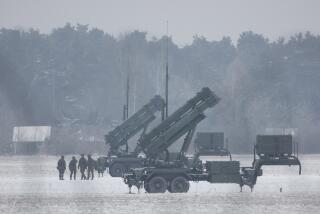Overall U.S. intelligence budget tops $80 billion
- Share via
Reporting from Washington — The U.S. government on Thursday disclosed for the first time in more than a decade what it spent in total on intelligence gathering in the fiscal year that just ended: $80.1 billion.
That’s more than the U.S. spent on the Department of Homeland Security ($53 billion) and the Justice Department ($30 billion), according to figures from the White House Office of Management and Budget. It represents about 12% of the nation’s $664-billion defense budget.
The total intelligence budget has doubled since 2001, Sen. Dianne Feinstein (D-Calif.) said in a statement.
“It is clear that the overall spending on intelligence has blossomed to an unacceptable level in the past decade,” said Feinstein, who chairs the Senate Intelligence Committee, which sets the budget and oversees policy.
Intelligence spending has long been classified, but in 2007 the government began revealing part of it — but only the amount not devoted purely to military operations. That figure, known as the National Intelligence Program, was $52.1 billion for fiscal year 2010, which ended Sept. 30, up 6.6% from the previous year.
The government revealed the total intelligence budget twice before, in 1997 and 1998, in response to a lawsuit. It was $26.6 billion and $26.7 billion, respectively, meaning the budget has tripled in 12 years.
James R. Clapper, the director of national intelligence, told senators during his confirmation in July that he persuaded Defense Secretary Robert M. Gates to disclose the Military Intelligence Program budget so that the public could see the full picture.
“I think the American people [are] entitled to know the totality of the investment we make each year in intelligence,” Clapper said.
Disclosure is a good thing, said Steven Aftergood of the American Federation of Scientists, who closely watches the intelligence community.
“It helps make the intelligence budget a normal part of government, and it also makes it possible for officials to speak plainly and honestly about the level of intelligence spending,” he said. “Those are both important things.”
The spending pays for everything from janitors to bureaucrats to spies under deep cover. It funds satellites, computer systems and other expensive hardware. And it pays for a vast array of private contractors, a cost that has skyrocketed since the Sept. 11 attacks.
In addition to the CIA, the intelligence community includes the National Security Agency, which eavesdrops on e-mail and telephone conversations; the National Geospatial-Intelligence Agency, which runs spy satellites; and the Defense Intelligence Agency, which serves the Pentagon. Each of the military services also has an intelligence component, as do several civilian government departments.
A breakdown of spending beyond the overall figure will not be released, officials said.
More to Read
Sign up for Essential California
The most important California stories and recommendations in your inbox every morning.
You may occasionally receive promotional content from the Los Angeles Times.














